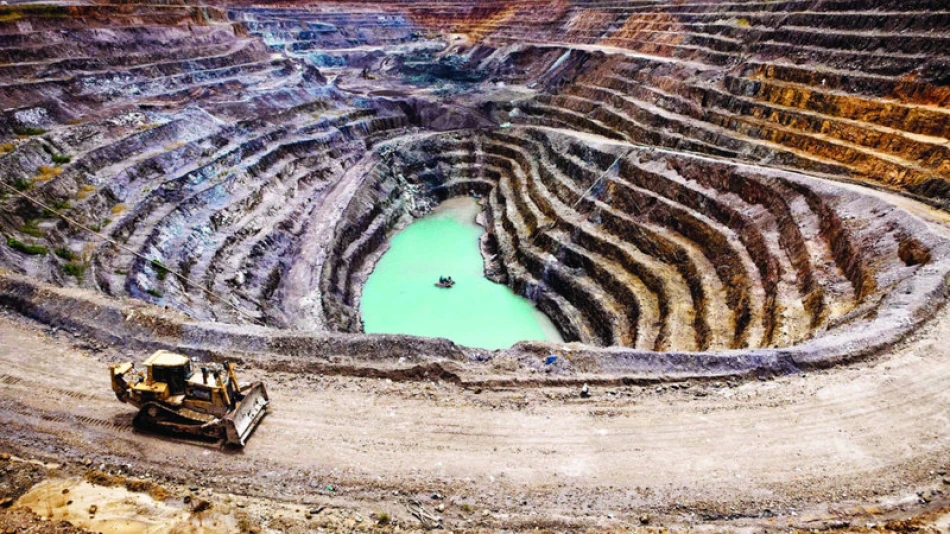
African Nations Impose New Rules Restricting Raw Mineral Exports, Challenging Trump's Policies
Africa's Resource Revolution Threatens Trump's Critical Minerals Strategy
The Trump administration's ambitious push to secure African critical minerals faces an unexpected roadblock: African governments are increasingly refusing to export raw materials, betting they can capture more jobs and revenue by processing them locally. This strategic shift by nearly half of Africa's 54 nations could fundamentally reshape global supply chains and complicate America's efforts to reduce dependence on Chinese-dominated processing facilities.
The Great Export Ban Wave
According to the Organization for Economic Cooperation and Development, approximately 27 African countries—from Angola to Zimbabwe—have imposed restrictions or outright bans on raw material exports over the past two years. This represents a coordinated continental strategy to move up the value chain, leveraging surging global demand for battery metals and renewable energy components.
Zimbabwe, Africa's largest lithium producer, exemplifies this new approach. The country plans to ban raw lithium exports entirely by 2027, having already pressured mining companies to build local processing facilities. The results have been dramatic: 5,000 new jobs created and lithium export revenues jumping from $70 million in 2022 to $600 million in 2023.
"Our ultimate goal is to produce batteries and solar panels, and in the long term we will achieve that," declared Zimbabwe's Mining Minister Winston Chitando last month.
Market Dynamics Fuel African Leverage
The numbers behind this shift are staggering. Global lithium demand tripled between 2017 and 2022, while cobalt demand surged 70% during the same period, according to the International Energy Agency. The U.S. lithium battery market alone is expected to expand nearly sixfold to $52 billion by 2030, Boston Consulting Group analysis shows.
This explosive demand has handed African raw material exporters unprecedented negotiating power—and they're using it strategically. Countries like Guinea, Uganda, and Namibia have introduced new rules banning mineral ore exports, while Ghana, Rwanda, and Zambia are expanding domestic metal processing facilities.
The Indonesia Model
African leaders are studying Indonesia's successful 2020 ban on unprocessed nickel exports, which attracted massive Chinese investment and now dominates global nickel production. However, analysts believe African nations may capture more value than Indonesia, where Chinese companies retained most of the economic benefits.
Implications for Trump's Africa Strategy
The export restrictions have already disrupted flows of unprocessed minerals—including manganese, lithium, and bauxite—to Asian and European smelters. This trend could significantly complicate the Trump administration's efforts to secure African minerals critical to U.S. manufacturing and defense capabilities.
The U.S. has been actively pursuing investment deals in African critical mineral sectors, with its recent mediation between Congo and Rwanda partly driven by desires to improve American access to essential materials. However, the local processing push may force Washington to fundamentally rethink its approach.
"I don't think the United States will slow down, and the important question is: what can the United States offer to justify changing the position of producing countries?" said François Conradie, an analyst at Oxford Economics Africa.
Chinese Investment Surge
As African export bans multiply, Chinese and Western companies are racing to establish new mineral processing facilities across the continent. China's state-owned Sinomine Resources is building a $300 million lithium processing plant in Zimbabwe, while another Chinese state firm, Ningxia Tianyuan Industrial, is constructing a $450 million manganese refinery in Ghana.
These investments will test whether companies accustomed to operating processing facilities in Asia can succeed in Africa, where skilled labor shortages and weak infrastructure pose significant challenges.
The Sovereignty Play
African policymakers frame this shift as economic sovereignty. The continent exports 75% of its crude oil, which is refined elsewhere and often reimported at much higher prices as petroleum products. Similarly, Africa exports 45% of its natural gas while 600 million Africans lack electricity access.
Mali's military leader, General Assimi Goita, captured this sentiment during the launch of a Russian-Malian gold refinery project: "The establishment of this gold refinery is a new confirmation of our economic sovereignty. It enables us to better benefit from gold revenues and its derivatives."
The Gabon Case Study
Gabon, which holds 25% of global manganese reserves, plans to halt raw manganese exports by 2029. President Brice Oligui Nguema sees this as a golden opportunity to build his economy through local processing of this steel and battery manufacturing essential.
Challenges and Risks
The strategy isn't without risks. When Zimbabwe initially banned raw ore exports in 2022, mineral smuggling across the country's porous borders surged dramatically. Small-scale producers struggling to survive began selling raw materials to Chinese companies at discounted prices. Zimbabwe, which loses an estimated $1.8 billion annually to mineral smuggling, was forced to ease the ban after several months.
This experience highlights the enforcement challenges facing African governments attempting to control their mineral wealth while lacking robust border security and regulatory capacity.
A New Investment Paradigm
For international investors, this shift demands a fundamental strategic recalibration. The era of simply extracting African raw materials for processing elsewhere is ending. Success will require partnerships that align with local development goals and bring genuine technology transfer.
"Investors who bring money and technical knowledge, and align with local development goals, may find strong opportunities in this new landscape," said NJ Ayuk, head of the African Energy Chamber.
The Trump administration's African minerals strategy now faces a choice: adapt to this new reality by investing in local processing capabilities and genuine partnerships, or risk being shut out of some of the world's most critical mineral reserves. The stakes couldn't be higher in an era where control of battery metals and rare earth elements will determine technological and economic leadership.
Most Viewed News

 Sara Khaled
Sara Khaled






